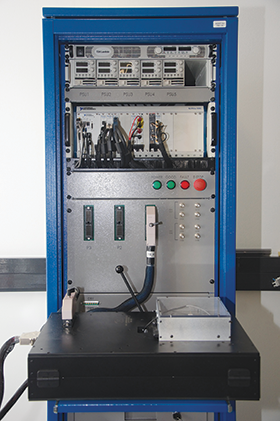
In this modern day and age, technology defines the way we live. The advancements made in the field of electronics change constantly and are ever evolving.
The need for better, more intelligent devices constantly encourages engineers to develop systems that use the latest technology.
Time has become a valuable commodity, especially in the electronics world because of the pace at which technology advances. This has forced companies to develop and produce products concurrently. This process creates an opportunity to assist the production of the product by ensuring that functionally tested products enter the final assembly, eliminating the likelihood of valuable engineering time wasted on fault finding.
Omnigo has been active in the electronics manufacturing industry since the 1980s and has kept up with the rapid change in manufacturing technology – from commercial to high-end military standard PCBs. Best practice for product manufacturing is to ensure the functionality of manufactured electronics before final integration. PCBs are tested and evaluated using the OEM’s in-house developed test equipment. The applicable test systems are usually product-specific and generally cannot be used in the testing and evaluation of other products.

Generic test systems offer a more versatile solution to product testing but require a broader range of software and hardware and still require product-specific test interfaces. These product-specific test interfaces, used together with a generic backbone, are usually much more cost-effective than a standalone set of test equipment.
The concept
Omnigo produces electronic products for a wide range of clients, each with individual requirements. The need for a generic test system presented itself as more and more clients realised the benefits of functional testing of their products before integration.
A team of qualified engineers was tasked to investigate and develop a test system that can be used for a variety of applications and products so that functional testing can be done effortlessly. Omnigo’s development engineering team has taken great thought and care in designing a test bench that is not only practical and easy to use, but also easy to maintain, scalable and has the third-party support to guarantee accurate and repeatable test results.
The TestBench
The Omnigo TestBench includes a wide range of test instruments/capabilities, ensuring most regular test requirements are met. The core of the 19-inch moveable test system runs on a National Instruments PXI chassis consisting of a high-speed controller running the latest versions of National Instruments TestStand and LabView. The system allows a test engineer to program isolated digital I/Os, analog I/Os, counters and timers as well as communication protocols such as RS-422, RS-485, I2C and SPI.

In addition to these functions, a 7,5-digit multimeter allows for highly accurate voltage, current and resistive measurements, to name but a few. Signal analysis can be done by the 500 MHz 2-channel oscilloscope multiplexed to eight channels and a 14-bit, 20 MHz arbitrary waveform generator complements the system.
The TestBench can power the client’s products with six individually programmable power supplies ranging from 0-20 V/0-10 A all the way to 0-300 V/0-2,5 A. Power measurements and loads can be implemented by the three active loads ranging from 0-500 V and 0-30 A with constant current, voltage, resistance and wattage functionality. The complete system runs through a UPS to ensure uninterrupted testing.
Additional interface cards can be added – such as communication protocols, motor drivers or even XJTAG – to expand test capabilities. The TestBench design has been properly industrialised and documented to facilitate ease of manufacturing, with only specific client software or hardware requirements to be added on.
The software
The Omnigo development team has taken great care in developing a software architecture that allows for scalable and maintainable test sequence development and reliable instrument drivers. Our proprietary generic driver framework enables the team to add new instrument drivers without any interruption to other test sequences.
The same amount of effort went into the development of its TestStand framework. The Omnigo TestStand Framework facilitates easy test procedure/step manipulation, addition or limit alterations.
The test adaptor
Based on the client’s test procedure, a test adaptor is developed to interface the client’s product to the TestBench. Test points, connectors or even components can be accessed via a bed-of-nails approach, enabling the engineering team to meet any client requirements in the test procedure with the least amount of operator interaction. The test adaptor is connected to the TestBench via dedicated signal and power looms which are keyed to ensure the correct connections are made every time.
Based on the complexity of the client’s product, our test adaptors can be developed to increase the test capacity by adding additional test sockets, speeding up the testing process and saving the client valuable time and money. A great amount of detail went into the test equipment design and through interaction with the client this ensures the best possible test procedure can be designed with the least amount of complexity.
Test sequencing
The test procedure or test sequence is then compiled using our own in-house developed TestStand/LabView architecture, enabling the engineer to program the client’s test procedure step by step to meet each test specification. All test results are captured in a personalised client result sheet listing the DUT (device under test) details, date of test, test result and any additional data.
The data generated is stored in a central database for further data analysis. The database will not only help to identify certain test patterns but it will enable the client, with the help of Omnigo’s engineering team, to identify risks during the production process.
As previously mentioned, time is money and Omnigo’s engineering team focuses on optimising the test sequence to complete the test procedure in the most efficient way possible.
Conclusion
In conclusion, the Omnigo TestBench offersa reliable test base from which test requirements can be met with ease. This ensures that another product is ready to be part of its technologically driven world, functionally tested in an economical and timely manner.
| Tel: | +27 12 803 8218 |
| Email: | [email protected] |
| www: | www.omnigo.co.za |
| Articles: | More information and articles about Omnigo |

© Technews Publishing (Pty) Ltd | All Rights Reserved